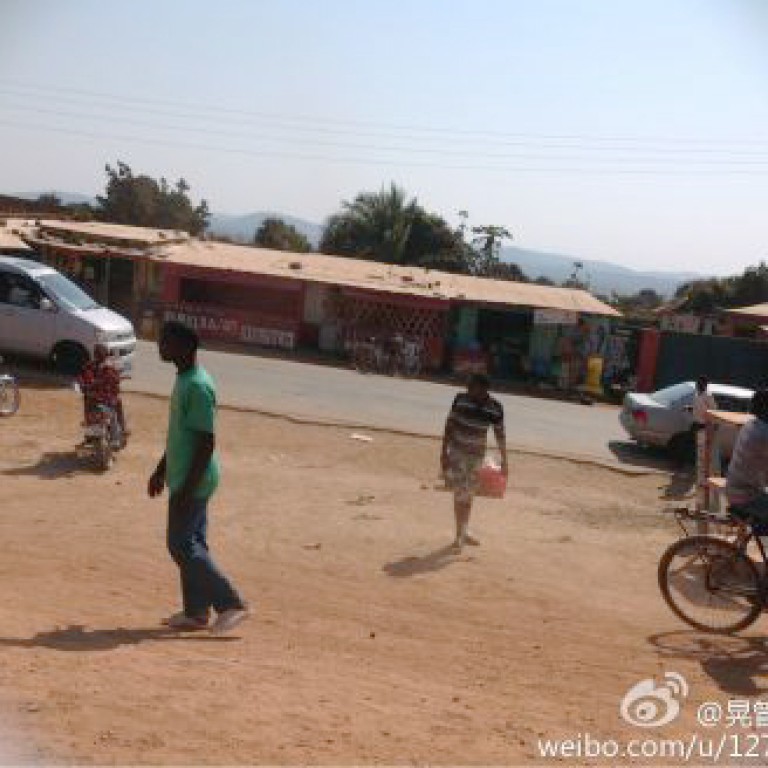
Chinese migrants thrive in the Congo, world's poorest nation
Why do Chinese move to the Democratic Republic of Congo?
As Chinese infrastructure projects are making inroads into the Democractic Republic of Congo, there are no statistics about Chinese migrants moving to the central African nation. Journalist Jacob Kushner documented their experiences in a book just published by the Pulitzer Centre on Crisis Reporting and talked to SCMP.com about his impressions in Kinshasa and Lubumbashi.
What reasons did Chinese migrants in the Congo tell you they had for moving there?
Many of Chinese I met were young and out of college. They were coming because this is where they found a job with Chinese companies outside of China. Others had been working in mining or smelting in China and came because they could get better jobs in the Congo. It's really just like people who migrate anywhere for job opportunities.
How large is the Chinese immigrant community?
Unfortunately there is no data. I can certainly say there are lots of people from other places, too. There are Indian businessmen who have stayed there for a long time, and I came across some recent Japanese immigrants. It's hard to say which one is the biggest community. The Chinese aren't the only ones, but it seems to be that the newest wave of migrants are people from China coming for work opportunities.
Congolese are excited about Chinese investment, but those familiar with the deals are worried because the Congo is giving away a massive chunk of its natural resources without even knowing their value.
Can you describe the Chinese community?
I would categorise the Chinese in a couple of different groups. There are those small-scale entrepreneurs, who came to do mining, or came to open a restaurant, or to open electrical shops. Many of them started coming more than a decade ago. One is a Chinese man, Doctor Zhu in Lubumbashi, who treats Chinese and Congolese patients with a mix of Western medicine and Chinese acupuncture. A lot of them have been there for a while and it seems in Lubumbashi many of them know each other and socialise. There is even a Chinese casino where some of them go and gamble at night.
The second category of Chinese migrants, a more recent one, are the Chinese coming with state-owned companies. These you tend to see working but you don't see them mingling with the Congolese as much as the earlier arrivals.
What are the big Chinese infrastructure projects in the Congo?
The Chinese have built things in the Congo for decades. The national soccer stadium, the Parliament building were built by the Chinese. Right now, some of the biggest projects are in the capital Kinshasa. The capital’s main boulevard, the Boulevard of June 30th, was renovated recently by the Chinese, as was the city’s road to the airport. If you go to Kinshasa, the streets are crowded with cars and there is certainly a need for better urban planning. But the way the Chinese do it, they come to the Congolese government and say: "We'll build whatever you need, you tell us". So it's really the urban planning part that is up to the government, and I'm not that sure they are doing that to the best of their abilities.
There are other projects too - a new hospital, and a newly renovated road connecting Kinshasa's airport to its downtown. All of these are part of Sicomines, the massive, US$6.5 billion deal by two Chinese companies and the Congo's state mining agency that are building infrastructure projects in exchange for the rights to mine copper and cobalt.
Tell me more about this Sicomines deal.
The Congolese government needed infrastructure to move forward after the Congo's devastating civil war. They approached two Chinese companies, Sinohydro and China Railway Engineering Corporation - which I don't believe had ever done mining before - and told them that if they built infrastructure, they would give them access to their minerals. Sicomines was eventually signed in 2008. The two Chinese companies would be able to mine a massive amount of copper over the next 25 years and in exchange they would build road and some hospitals around the country worth US$3 billion. At first it was US$6 billion, but it has since been scaled down to about US$3 billion worth of public infrastructure.
What is public sentiment over Chinese investments?
Generally if you ask people on the street, the Congolese are excited about them, but those who are familiar with the deals are worried because the Congo is giving away a massive chunk of its natural resources without even knowing the value of what it is giving away. There is no study of what all this copper in the Sicomines deal is worth. People are worried that the country isn't getting a fair deal and, most of all, people are always worried that the Congolese government will spend the money in ways that won’t help the Congolese people.
How do you see Chinese migration to Congo developing?
I don't see any indication that migration to the Congo is slowing. To the contrary, we are witnessing more and more Chinese seeking work opportunities. The length of that trend will depend upon Africa's investment potential and whether Chinese companies continue to be funded by Chinese state banks and take on these projects. If they become more hesitant in terms of risk, you will see the trend curve off a little bit in terms of new Chinese arrivals. It will also depend on the ability of the Congolese government to continue to make itself a reliable place for investments.

